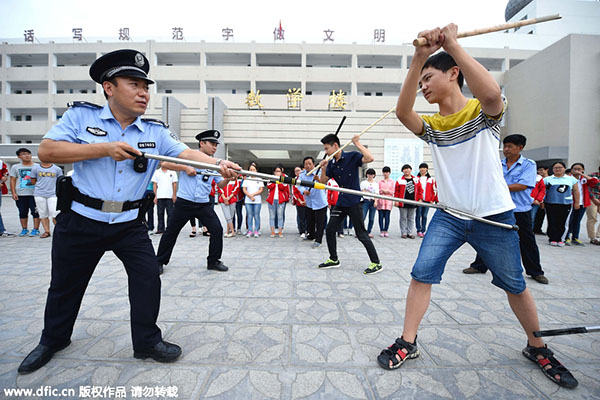 |
|
Students practise self-defense skills with police officers at a middle school in Bozhou city, East China's Anhui province, Aug 27, 2015. [Photo/IC] |
67 typical cases provide snapshot of behavior on campus as experts call for help to guide students
The Supreme People's Court published a list of 67 criminal cases on Friday which they say is typical of the crimes being committed in middle schools.
The list shows that campus violence is a serious problem nationwide. It has prompted experts to call upon the public, especially NGOs, to help schools advise students on how to avoid crime and stay safe at school.
Of the published cases, 38 were injuries arising from fights or attacks. Brawls, disturbances of public order, robbery and rape are also on the list. The top court said that the average age of the offenders is between 15 to 17, and most of them are boys.
Vocational schools are a "harder-hit area", said Sun Jungong, the top court's spokesman, "because security supervision on the campuses is far from enough, and many students lack family care".
"Everyone has responsibility for protecting children and the campus disputes need the public's long-term attention, not just temporary crackdowns," Sun said.
Duan Siming, a senior judge at Fujian Provincial High People's Court, said that his court has built a network with local women and juvenile associations to try to understand more about teenagers and how to solve their disputes.
"Social associations know more about how to guide and talk with adolescent children than judicial officials," Duan said.
"With their help, we can provide more targeted legal solutions for juveniles and give them knowledge about the law."
Yao Jianlong, a law professor with Shanghai University of Political Science and Law, said that social workers specializing in child protection are better at recognizing disputes among teenagers.
"A number of social workers and volunteers are young, which makes it easier for them to get along with students. This helps them find problems and intervene more quickly than families and teachers. It is especially better for left-behind children who lack family support," Yao said.
Some social worker associations in Shanghai have gone onto campuses in a pilot program to guide teenagers and prevent them getting into trouble, he said, suggesting the program should be extended across the country.
Zong Chunshan, director of the Beijing Legal and Psychological Counseling Service Center for Juveniles, said: "Juveniles spend most of their time in schools, so training in things like self-defense is more suitable on campuses.
"Physical education should be improved, as sports like football can help teenagers release anger or unhappiness."
Efforts of schools and families are not enough at times, "which is why we encourage more NGOs to join us, providing their wisdom in child protection and sharing our burden", he added.